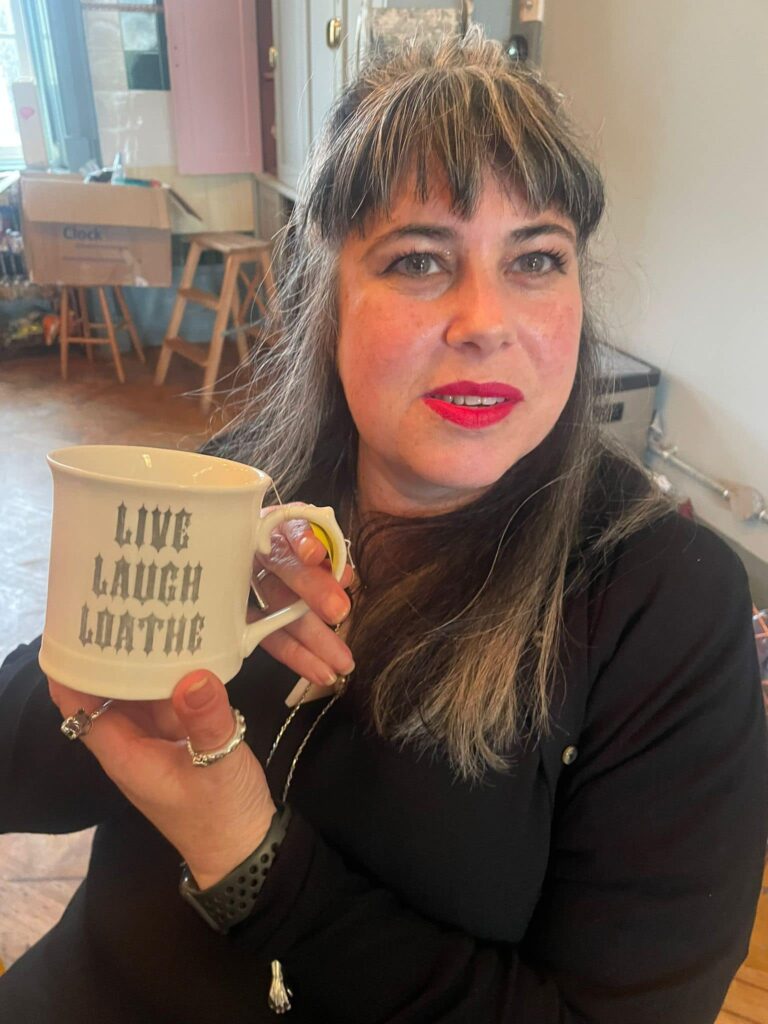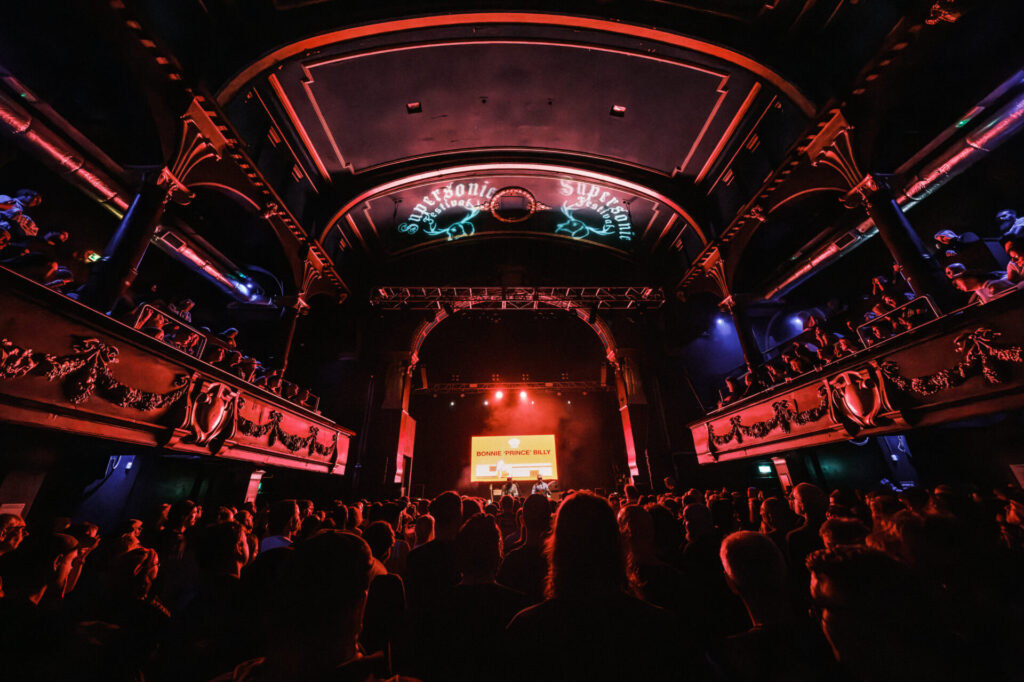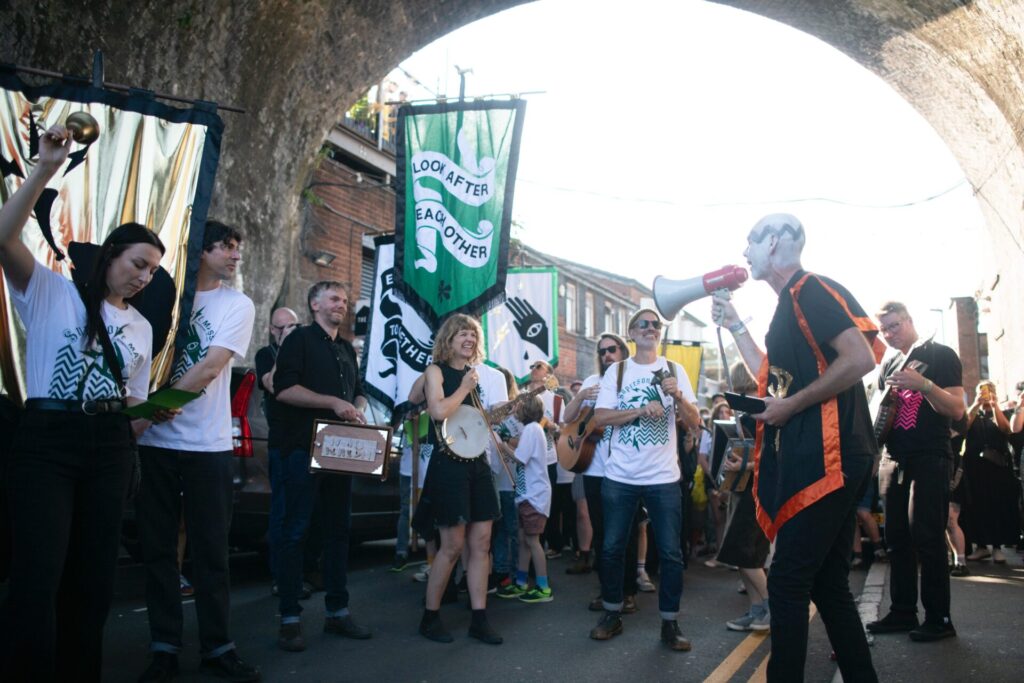In the few days between tQ’s interview with Lisa Meyer, artistic director and founder of Supersonic, and its publication, news breaks that just a few weeks out from this year’s edition, the Digbeth festival were told that due to property developers, they would no longer be able to use the space that has long served as their marketplace and food court. At the last minute, they were forced to pivot, finding an entirely new hub for their event at the nearby Zellig Building. It throws into stark relief just how challenging it is to put on a festival like this – as radical in the sound of its artists as it is in its commitment to DIY principles – in 2025.
As Meyer tells us in our Q+A below, things have never been as tough as they are now. Rising costs, gentrification and uncaring authorities are now squeezing resources to the point that it’s a minor miracle that events like this happen at all.
And yet, those miracles are still being worked. Supersonic has once again provided a lineup that represents the absolute finest from the international underground. There are established favourites – Richard Dawson, The Bug, Six Organs Of Admittance – rising artists approaching the peak of their powers – Aya, Moin, Divide & Dissolve – and a slew of newcomers each finding entirely new ways to push at the boundaries. Then there are film screenings, workshops, and the multi-disciplinary programming at the festival’s rooftop bar. It adds up to a weekend that doesn’t just feel like a festival, but a nexus point for the wider underground community.
This year’s Supersonic takes place from 29 to 31 August, with remaining tickets (including solidarity tickets, where those with more money are encouraged to pay extra in order to subsidise those who might otherwise be priced out) available now. As we gear up for another miraculous Digbeth weekender, tQ caught up with Meyer for a deep dive into the challenges facing this year’s edition, the highlights of the lineup they’ve put together despite them, and more.
Let’s begin with a look back to 2024’s edition. What did it tell you, and how have things been for Supersonic in the months since?
Lisa Meyer: Last year was really tricky, because property developers took one of our main spaces about three months before the festival. That situation has got worse in Birmingham. We grew up in the wild west of Digbeth, where anything could happen, but now with the amount of spaces left you’re trying to get a square peg in a round hole. It’s very difficult to continue with that model. Also, for independent festivals there are rising costs, funding pressures and unpredictability around audiences that are still very much at play, and that financial squeeze has really intensified. So yeah, I don’t think it’s ever been as tricky as it is now to put on a festival. But we’re incredibly committed to what we do. It’s a labour of love, and it’s against all odds that we’re making something happen. Particularly in Birmingham. We just honoured Ozzy and Black Sabbath but it took decades of lobbying the council [via the heritage project Home Of Metal, which Meyer co-founded] to get them to recognise them properly, so you can imagine what it’s like to get any support for something like Supersonic. If we were in a different city, we might have quite a different experience, but we’re rooted here for the moment.
A lot of these issues can feel widespread when it comes to the larger British DIY arts scene. What’s specific to Birmingham?
LM: I just think that Birmingham is not great at recognising counterculture, or more independent offers. It’s quite risk averse. But maybe that’s part of what makes us, that we aren’t accepted by the mainstream and that’s what we champion. So maybe rather than fighting it, we should just accept that that’s our mission.

As tough as it is day to day, you do feel that energy of resistance on the ground at Supersonic?
LM: I think it’s this constant balancing act of ambition with pragmatism. We’re trying to carve out a space for artists and an audience, and support that audience and those artists in a way that perhaps they don’t get in other places. And it’s not just about what we’re doing, it’s as much as the artists we’re booking putting in the effort to give their best performance, and the audience being very good listeners; they’re not just there to get fucked, they’re very supportive of the artists that are playing, even if they’re fairly unknown before playing Supersonic. And from there there’ll be a buzz about them, and hopefully that creates that next step towards playing in other places. So I think that collective energy is what fuels it.
It’s a cliche, but true nonetheless, that limitation breeds creativity
LM: And I think for a lot of the artists that we work with, Supersonic is not the festival to come to if you’re just doing the summer festival rounds. The artists that play are fans of the other artists, and they’re coming to be part of a community. We owe a lot to those relationships we’ve built with artists over the years.
It’s the third year of the solidarity ticket scheme. Has it been a success?
LM: Yeah, I think so! People are signing up to get those tickets, and new people are coming all the time to the festival which is exactly what we want. I would love it if we could expand even more, but we’re limited in terms of how many subsidised tickets we can offer. When we started in 2003, our audience that were in their 20s then are now in their 40s. So to maintain a younger audience without pricing them out, we want to make it as accessible as possible. And we have got that loyal audience who buy into what we’re about, some of whom are able to pay a little bit more, which then allows us to work with partners like Decolonise Fest and 0121 Queercore and reach out to invite audiences from within their networks.
Does the fact that people are willing to pay more give you hope for the wider endurance of this community? Some are also pointing towards things like the grassroots ticket levy as a source of hope.
LM: I feel really torn that we have to rely on the generosity of those that can afford to put something back in. I’m pleased that we share those values with a lot of our audience, but also sad that this is the space that we’re in, that culture is so unaffordable, and that it’s not being subsidised through cultural funding. And with the ticket levy, a lot of venues are not even putting that money back into grassroots venues, but to pay for their own maintenance. It feels as if any way those venues can try to get a little bit more money out of people, they do. People always say to me, ‘well if you just charged a bit more for your pints, or charged a bit more for the samosas, people would pay for it.’ But you want to be fair. It’s not about rinsing people for one weekend, I want people to come back year on year and feel like they’re respected. That they’re loved, really.
Focussing purely on maximum profit would make Supersonic a very different kind of festival…
LM: We’d have a very different lineup as well. I often joke with our designer, David, about creating a second festival called Dude Fest, where we’d have a van charging 10 quid for a shit burger, maybe one band fronted by a woman but other than that entirely dudes. Then we’d make so much money from that that we could subsidise Supersonic!
Last year saw you forced to use the O2 Institute for the fist time after, as you mentioned, a nearby warehouse venue was taken away by property developers just a few months out from the festival. You had reservations at the time about using a non-independent space, how do you think it went?
LM: Where the O2 Institute works is that it’s got that sort of faded grandeur, like The Bowery Ballroom in New York. So it fits with our aesthetics I suppose. And from an audience perspective the sight lines are so much better than a warehouse space. And there’s seating. So from a production point of view, I think it worked. Where it’s tricky is that we can’t have things like our reusable cups, and we have no control over not charging excessive amounts for alcohol and things like that. It’s extremely expensive as well – so part of me cries inside, thinking ‘we should be spending that on artists’.
This year we’ve got artists like Witch Club Satan playing there, who are very theatrical with their performance, and I think that it will be such a different experience for the audience to be able to see them on that big stage, as opposed to lower down in a warehouse space. We’ve still got [central hub] XOYO which is more of that black box warehouse sort of space, so it’s nice that we’ve got that juxtaposition.

You’re also using a totally new venue, Nortons. What can you tell us about that?
LM: Again, we had trouble in that XOYO double booked us on a Friday night. Norton’s is an Irish bar, literally around the corner from the Institute, a very DIY space. Again, we’ll have that juxtaposition. The more dancey, DIY things will work really well there. We’ve got Water Damage, who have that really motoric sort of sound that will suit that sweaty vibe. Whereas at the O2 we’ll have more of a theatrical offering, with stuff like Mermaid Chunky who will be doing an expanded performance with dancers.
Speaking of the bands themselves, who are your personal picks from this year’s lineup?
LM: Well, we’ve got three UK exclusives. Witch Club Satan, a Norwegian feminist black metal band who jump into the audience. I think we’re in for a real treat with them. Then another exclusive from Funeral Folk, which is Maria W Horn and Sara Parkman. I saw their performance at Rewire Festival and was moved to tears. It’s one of the most haunting shows I’ve ever seen. Really, incredibly beautiful. They take you on this journey of loss and mourning, and then straight after that we’ve got The Bug and Warrior Queen, and a cathartic opportunity to dance our way out of our sadness. Then the other UK exclusive is Backxwash, which is really exciting.
Then we have things like the Palestinian Sound Archive coming. I think it’s really important to create that space for resistance and for people to come together, particularly at this point in time, and to support those collective moments. We’ve got Burd Ellen doing a folk singing workshop, and she’ll also create a sort of Supersonic choir. We’ve also got a few special performances and DJ sets up on the rooftop, like one from Maxine Peake, as well as a couple of surprise collaborative performances that will happen there from past artists who have played. So there’ll be surprise moments as well.
To me, Supersonic feels like a condensed insight into the wider state of underground and left-field music. What can we gleam from this year’s lineup more widely?
LM: It feels like, even as everything is shutting down and becoming more difficult, that it feels like the DIY scene is really energetic. There’s so much to look forward to. Like in Birmingham, we’ve got a promoter called 0121 Queercore [who are partners in this year’s festival], who are focused on trans and queer punk. They created that night because they didn’t see their music being reflected within the straightforward hardcore scene, and I think that’s just so exciting. The same way that Decolonise Fest [another partner] created their own scene as well. It feels like people are being really proactive, whereas a decade ago it felt like there was still a lot of passive consumerism of music. I think music is becoming very politicised as well, and that it’s important to use your voice and your art form to speak out against what’s happening in the world. Again, a decade or so ago there was more ‘music for music’s sake’. That’s also important, but I also feel like it’s important that Supersonic and a lot of the artists that we’re putting on, have got something to say. I feel like we’re so under the radar that people can say what they want and they’re not going to be on the front page of some shit newspaper.
Supersonic Festival takes place in Digbeth, Birmingham, from 29 to 31 August. For the full line-up and remaining tickets, click here.


